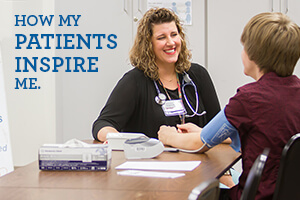The benefits of volunteering
Health care is expensive. There are many people who must choose between buying groceries and paying their electric bills versus paying for prescriptions or medical visits.
Food shelves around Minnesota often help to support some basic needs with nutrition and personal hygiene items. There also are free clinics, but they are few and far between. Therefore, there is a gap in coverage where people who may really need health care are not able to receive the care they need.
By meeting people in our community who are faced with these challenges, I have been inspired to volunteer with Project H.E.A.L., which provides free medical screenings and social services consults for underserved populations. As a physician, I have a desire to help keep people in the best health I can. Volunteering with Project H.E.A.L. helps me see patients in their environment and puts their real-life dilemmas in perspective for me. It allows me to connect to these patients in a much more relaxed setting and provide one-on-one support for health and wellness in the community. In addition, through volunteering, I have found myself feeling happier!
We often think of volunteering as positive for the people or organizations we give our time or service to. However, there are great health benefits to those who dedicate their time volunteering as well including:
- Enjoying a sense of purpose and fulfillment which helps to increase self-confidence.
- Staying physically and mentally active. Nearly half of all volunteers say volunteering has improved their physical health and fitness.
- Reducing stress levels.
- Opening doors to new life opportunities through new social connections or work place volunteer experiences.
- Increasing personal satisfaction in retirement. A study of older adults found that participation in community service was more strongly correlated with life satisfaction for retirees than for those individuals who continued to work for pay.
- Making new friends.
- Increasing job opportunities for school-aged individuals. Volunteering builds social skills and develops awareness. It helps boost college applications for high school students and can increase college students’ job placement possibilities after graduation.
- Feeling connected to community by supporting local organizations and investing in positive outcomes that support a healthy community.
- Experiencing “The Happiness Effect.” You know that feel-good sense you get after a vigorous workout? It comes from a release of dopamine in the brain. Helping others has that exact same effect — so the more you volunteer, the happier you become!
So, if you are looking for a new way to feel happier, more physically active or meet new people, consider volunteering in your community. It could be the health care prescription you need!
Learn more about volunteering opportunities through CentraCare Health.
